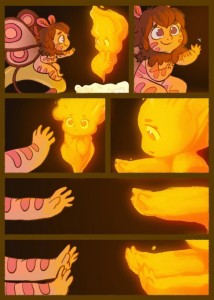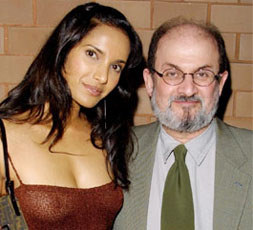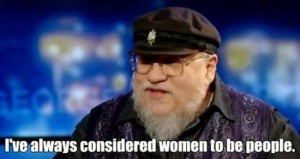Despite modern advances, one could say that being a writer today is actually somewhat harder than it was in the past. It’s true that anyone can get published now due to the ease of self-publishing through eBooks. The indie market is thriving now more than it ever has in the history of literature. But at the same time the industry is dwindling, the market is saturating, and the money is flowing in other directions. This will change with time, but we’re in something of a pinch that never existed before and it does put you under some pressure to consider all angles as you write.
One of the new things to become an issue in the modern day is the idea that your work offending someone might, in turn, cause an angry horde to come kicking down your digital door. In the old days, if you pissed someone off you might have a fatwa declared against you like Salman Rushdie did. But Salman could just avoid going to countries where people were likely to carry that out. It worked for a lot of people who needed to avoid the people their work offended and, as I often like to point out, it worked out just fine for Rushdie.
But the internet brings everyone right to your doorstep. Maybe they can’t pose a serious threat to your life (though many may try to make you feel like they could), but they’re there and they never go away. Some people have had this hit them and rode it like a wave into success. Would we have seen the phenomenon of Harry Potter had fundamentalist Christians not lost their god damn minds over it? It’s hard to say. But what isn’t hard to say is that, before Harry Potter, most children’s book series were lucky to net their author 6 figures and Rowling has easily crossed 8.
But for newer writers, I have something important to tell you…
Be Mindful, But Ignore The Haters
This is going to fly in the face of all logic according to the internet, but you shouldn’t have to write a story that perfectly represents everyone’s point of view. In fact, the act of trying to please everyone will inevitably destroy your work. What you need to do is write a story that reflects what you want to say. And that means at times you’re going to make someone angry somewhere. They may even deride and mock your work for not meeting their ethical standards. But, let’s be honest, if sensibilities were universal then no one would argue. Look out the window: is there world peace yet?
Then I think you’ll be okay with sticking to your own ideals and making your own viewpoint clear in your work. You may make some people very angry but other people are going to like what you’ve done. I think a lot of you are going to know that and work that way on your own. But I’ll let you in on a little secret: I was terrified of pissing off the “wrong” people a couple years ago. So I’m sure there are others out there like I was when I first started.
I’m a socially progressive sort of guy, a full and complete egalitarian and wanting to see all people from all walks of life given the same opportunities to succeed and be happy. I can’t stand discrimination in any of its forms. But sometimes the fact I’m a tried and true “egalitarian” means that I’m going to conflict on some points with the larger movements. And this reflects in my work, both in my novels and in my other writings. For instance, I’m sure someone, someday, is going to yell at me for what they perceive to be…
Cultural Appropriation
I’m going to cut it to you straight here, unless you happen to share this blog entry, my blog numbers tend to be soft. I keep it up because frequency of updating is good for this sort of thing, but I’m no where near what you would call “famous”. And if I ever did become well known enough to have my work reach certain corners of the internet I could guarantee you one thing: someone out there would have a knee-jerk reaction and condemn Alternative Mythologies for “cultural appropriation”.
Cultural appropriation is definitely something that exists in the world, but a lot of it comes down to the intention of what you’re trying to do. There’s a real argument that this drunk white guy has no business wearing a recreation of a native American headdress while throwing a party. The thing is, once upon a time, we all agreed that guy fell into other categories: “insensitive”, “racist”, “inconsiderate”, “asshole”. But as identity issues have become prevalent on the internet, the idea of cultural appropriation has expanded to start including far more than just those douche bags. Now it tends to become a blurry line drawn in different places depending on who you ask.
This is part of the polarization of the internet. There’s a real need to stand against the promotion of stereotypes, double standards, and ignorance. However, one of the things we need to do most in this world is make legitimate cultural exchanges for the sake of bettering everyone involved. We can’t erase stereotypes if we never allow cultures to exchange and intermix. The reason for this is simple: for every dumb-ass with a stupid Chinese tattoo they don’t understand, there’s someone else in the world who learned the language legitimately out of respect. And that’s the real line that divides “appropriation” and “exchange” – respect.
Now, anyone who has actually read the Alternative Mythology blog entries (and if you haven’t, you should) knows that I’m doing it for the best of reasons. I shine a light on lesser used cultures to try to inspire people to use this rich tapestry of human history in their work (including myself, as I think of ways to work them into my future novels). With luck, someone may read my brief introduction to a culture and decide they want to go that direction. If I succeed, the fantasy genre would become more inclusive and reflect more of the world than our current Euro-centric fantasy model. If that’s wrong, I don’t want to be right.
But to some people, that will never matter because I am white and that makes them feel like I am stealing from their cultures rather than trying to include them. It’d be easy for me to get angry and offended, but that doesn’t help anyone. And they’re right, I am white. I am so white I could disappear by standing against drywall. My skin is so translucent that if I were to inject radioactive dye into my veins you could see me glow in the dark. I can’t get a tan because lotion burns off rapidly when your skin sets itself on fire. The point of what I’m saying is: I was called “gringo” as a child for a reason.
However, what I am trying to do with Alternative Mythologies is still right and I’ve guided people to show respect and not use blind stereotypes in the place of real research. If someone, anyone, is inspired to try out a different mythology with one of my entries even in the slightest – I’ve made a positive change. And the good news for me and you is that there are going to be several rational people for every one of those irrational people. The fact those rational people exist won’t stop the irrational people from yelling, but it does mean they aren’t the only voice in the discussion.
If you’re mindful and respectful, you can ignore the screaming voices and listen to the rational ones. That goes true for another thing as well…
“Fridging”
This concept is getting very popular on the internet as social media makes it easier for ideas to disseminate. Back in the day only comic nerds like myself were particularly familiar with it. But today, the concept of fridging has expanded and evolved to include a lot of things it didn’t originally.
For the uninitiated, the concept of fridging is the act of killing a character from an underprivileged or under-represented class of people only to motivate your SWM protagonist towards JUSTICE™. It started in comic book discussion groups because there is a tendency for lazy writing in comics – very lazy writing. The ratio of male to female characters in comics is so skewed from the start that the ratio itself probably bounces every time another female character dies. So when you kill one off simply for the act of motivating your protagonist, you’re already on thin ice.

But in recent years, the critique has been moved to other things. Once, it was directed strictly towards comics, but now it is applied across the board to all media. On top of that, it’s now being applied to minority characters and people from other sexual orientations as well. Basically, someone in the world is going to argue you “fridged” someone anytime you kill a character who isn’t straight, white, and male. But is it always “fridging”?
That depends mostly on you.
The fact of the matter is it’s fridging if you created that character strictly to die. If that’s all they were there for, you’ve fucked up. And if you take a character who was a positive figure and then you mangle them just to motivate your protagonist, that’s also fridging. But if your character’s life matters more than their death and their death matters as more than just motivation for your protagonist, you’re doing okay. In fact, if you can answer what that character’s impact was besides “they needed to die to make him want revenge”, you’re probably headed in the right direction.
To put it another way, George “Redwedding Redrum” Martin has been complimented several times for having strong female characters. There’s a famous interview where he said he considered “women to be people” as a smartass response to a stupid question. But if you think for a second that George wouldn’t slaughter every one of those characters because that’s what he does to everyone, you’d be crazy. Once again, the point is to be mindful rather than afraid.

But there’s one field where I’m almost tempted to say to go ahead and tick people off…
Religion
One of the greatest driving forces in the world is the human need to believe in something greater. And, because it is such an inherent force in our world, provoking it is actually somewhat beneficial to your career. Dan Brown’s novels thrive on the idea that he made a lot of Christians a bit uncomfortable. Christopher Hitchens was a famous author and speaker based solely on the fact he pissed religious people off. And the day JK Rowling angered fundamentalist Christians was the day she could start writing giant checks without a care in the world. And that’s why this is the PC that I think you should care about the least.
Religious people come in many flavors and styles. Quite a few of them understand that there’s room for question in their lives and are willing to look at their own beliefs in a different light. This means they’re going to read your material with open eyes and consider it from there. But others are going to hold onto their beliefs so tightly that when they become angry with your work they will hold onto it like a starving dog trying to rip a chunk of beef off of Lady Gaga’s dress.
These are people who are incredibly dedicated, very organized, and very loud. If they find your book offensive, they will make a point to be as loud about it as possible. They will publicly condemn you and make you sound like a force of evil. For some of you, that sounds terrifying. To those people I say to consider this: people burned Harry Potter books for teaching “witchcraft” and the woman who wrote that series is now the richest writer of all time. These people are loud, they will get a lot of attention, and the whole time they will be pointing at your book and telling people who’d never even heard of it that it is provocative. And those people who are told it is provocative will, in turn, become morbidly curious and buy it.

In a way, it’s not really fair. These people are true believers and they feel threatened. But sometimes they just do it to themselves. One moment, no one notices your work because it was just overlooked. The next moment you have an army of people providing you free advertising as they make an ass of themselves in public. And, funny enough, when they do happen to sink their teeth into something they want to condemn…
It tends to go more viral the less rational they sound.
(I write books. They’re full of stuff that might piss someone off. But I’m not sweating it! Also, I’m kind of wondering what Monster tastes like)














